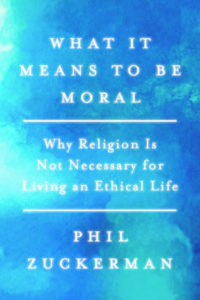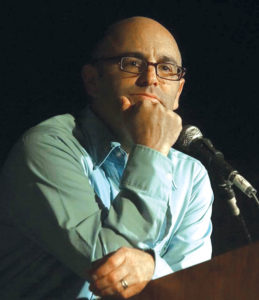What It Means to Be Moral: Why Religion Is Not Necessary for Living an Ethical Life

BY PHIL ZUCKERMAN
COUNTERPOINT PRESS, 2019
400 PP.; $28.00
In his new book, What it Means to Be Moral: Why Religion is Not Necessary for Living an Ethical Life, Phil Zuckerman, who is a professor of sociology and secular studies at Pitzer College, moves beyond the hordes of books deriding the claims made by the religious that one cannot be good without God. What he chooses to debunk is not religion per se but theism, the belief in the existence of a god who intervenes in human affairs.
Still, as advertised in the book’s title, Zuckerman offers an approach to morality that does not require one to turn to an external source for ethical guidance. Those ardent atheists who view religion through a black-and-white lens may take him to task for acknowledging that one can be religious and still be a moral and ethical being, and that God is not the sole source of morality for many religious people.

Phil Zuckerman
But this is not a book designed for those looking to smash religion to smithereens. Rather, Zuckerman offers a blueprint for how one can look inside one’s own reason and conscience and see how they have been informed by humanity’s evolutionary past.
Throughout his analysis of the basis for human morality, Zuckerman states repeatedly that secularism in and of itself is not a global panacea. As he recounts the countless atrocities committed in order to appease a given culture’s god or gods, he also cites heinous acts sanctioned by godless butchers like Pol Pot and Joseph Stalin. But Zuckerman observes how combating such immorality on a massive scale cannot be achieved by offering prayers and awaiting divine intervention. “In reality, there’s nothing divine or otherworldly about genocide,” he writes. “It is, rather, an unfortunate result of our own natural predilections.”
In this clear, compassionate, and concise guide, Zuckerman examines how humanity’s penchant to do harm to others and to the planet can be addressed through the framework of secular morality. Here Zuckerman identifies seven secular virtues: freethinking, living in reality, here-and-nowness, acceptance of existential mystery, scientific empiricism, cosmopolitanism, and empathy/compassion. These virtues can be applied to all people but have a particular value for those looking to live a moral secular life.
Underlining What It Means to Be Moral is Zuckerman’s belief that humanism is what makes agnosticism and atheism moral. Humanist principles that empathize human worth and dignity can provide the foundation of secular moral orientations. Acknowledging that secular counters to immorality are varied and multi-pronged, Zuckerman observes that what “secular solutions share is a reliance upon evidence and a rational, empirically-based approach to solving social problems with the ultimate goal of alleviating suffering and increasing well-being—the very veins and arteries of morality.”
Yet there still remains the perception that religious Americans have higher than average charitable tendencies. Zuckerman debunks this myth utilizing research laid out by David E. Campbell and Robert D. Putnam in their 2010 book, American Grace: How Religion Divides and Unites Us. That research showed that charitable giving increases when people gather together in communal, congregational-type settings. Conversely, people who claim they believe in God but are unaffiliated with a particular religious community donate less money and time than those in communities, secular or religious.
This research also points to the possibility that those who participate in humanist communities could offer their time and talents in the same percentages as those affiliated with religious communities. The poll numbers seem to indicate this possibility could become a reality given the ongoing exodus of people leaving institutional Christianity. But even though the nones have emerged as the largest voting bloc by faith according to the 2019 General Social Survey, they aren’t yet courted seriously as a voting bloc in US elections. This omission appears to disregard what Zuckerman views as the greatest value of secularism, which is its moral heart that he opines “allows us to be just and humane for all the right reasons and with all the duties and responsibilities a world without God entails.”
While Zuckerman concludes his work with optimism over the rise of secularism, one can’t deny the concurrent rise of a global politics infused with right-wing religious ideology. Hence, the secular morality he describes in detail throughout his book may still feel marginal at this current juncture. But large-scale grassroots movements like Black Lives Matter and #MeToo were launched by individuals who do not claim affiliation to a particular religious institution and might point to the emergence of a humanist morality that could be inclusive of all peoples. For those looking to join such a movement, Zuckerman’s book serves as a valuable tool and source of inspiration and guidance in creating a world based on humanist ethics, not religious dogma.
